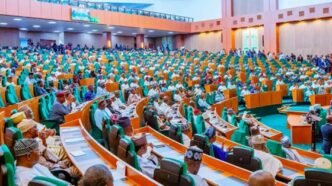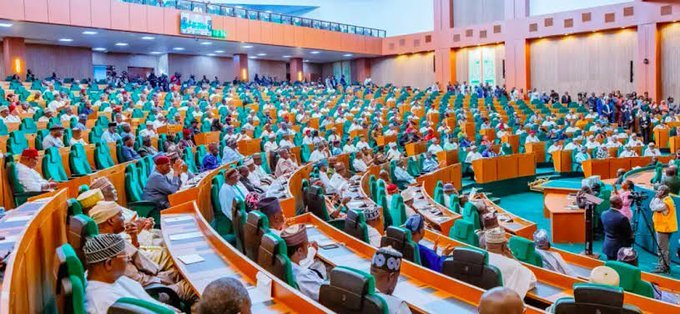Abuja, October 9, 2025
The House of Representatives has ordered a full-scale investigation into the $18 billion reportedly spent on the rehabilitation and maintenance of Nigeria’s state-owned refineries — Port Harcourt, Warri, and Kaduna — over the past two decades. The decision follows mounting public outrage over the continued non-performance of the facilities despite massive government investments aimed at restoring their operational capacity.
The motion for the probe was moved on the floor of the House by Hon. Ikenga Imo Ugochinyere, Chairman of the House Committee on Petroleum Resources (Downstream), and received unanimous support from lawmakers. The investigation will scrutinize the expenditure patterns, contractual obligations, and management decisions surrounding the repeated Turnaround Maintenance (TAM) projects that have yielded minimal results.
Background: Billions Spent, Little to Show
For years, Nigeria has invested billions of dollars in its refinery system, yet the plants have remained largely dormant. Official reports indicate that successive governments approved funds for TAM projects meant to revive the three refineries, which have a combined installed capacity of about 445,000 barrels per day.
However, the refineries have consistently failed to operate at even 30 percent capacity, forcing the country to rely heavily on fuel imports to meet local demand. The National Assembly estimates that about $18 billion has been spent since the early 2000s on contracts, consultancy fees, and rehabilitation projects with little or no tangible improvement.
Despite several announcements of completed or near-completed rehabilitation works — especially at the Port Harcourt refinery, which was said to be ready for test runs earlier this year — the plants remain largely non-functional. The lawmakers said it was time to unravel why so much money had been spent without results.
Lawmakers’ Concerns
In moving the motion, Hon. Ugochinyere said the investigation would expose the circumstances that led to the prolonged failure of the refineries. He described the situation as “a national embarrassment” and emphasized that Nigerians deserve accountability for every dollar spent.
“The Nigerian people cannot continue to suffer the consequences of a fuel-dependent economy while billions of dollars have vanished in the name of refinery maintenance,” he stated. “This House will get to the root of the matter and ensure those responsible are held to account.”
Lawmakers across party lines supported the motion. Many noted that the failure of the refineries has worsened Nigeria’s economic challenges, increased fuel prices, and drained foreign reserves through continuous importation of refined petroleum products.
Some legislators also called for the inclusion of former ministers of petroleum, past Group Managing Directors of the Nigerian National Petroleum Corporation Limited (NNPCL), and all contractors who handled TAM projects in the investigation.
Scope of the Investigation
The probe will cover a wide range of issues, including:
- Financial Expenditure Audit:
Lawmakers will examine how the estimated $18 billion was disbursed, the sources of funding, and whether the payments were tied to measurable outcomes. - Contract Review:
The investigation will review all contracts awarded for the rehabilitation of the Port Harcourt, Warri, and Kaduna refineries, including the identity of contractors, contract terms, performance bonds, and completion status. - Technical Assessment:
Engineers and independent experts will be invited to assess the current condition of the refineries and determine if any real rehabilitation took place or if funds were diverted. - Regulatory Oversight:
The Committee will also examine the role of supervisory agencies, such as the Ministry of Petroleum Resources, the Nigerian Midstream and Downstream Petroleum Regulatory Authority (NMDPRA), and NNPCL. - Policy Recommendations:
Based on findings, the House may propose reforms to ensure better accountability and transparency in future projects, including possible privatization or public-private partnerships for the refineries.
History of Failed Turnaround Maintenance
Nigeria’s refinery troubles date back to the late 1990s, when operational inefficiencies began to cripple production. Between 1999 and 2023, multiple administrations awarded contracts for TAM to foreign and local companies.
In 2019, the Buhari administration approved over $1.5 billion for the rehabilitation of the Port Harcourt refinery, with Italian firm Tecnimont S.p.A. contracted for the job. The project was expected to be completed in three phases, with full operations targeted for 2023. Similar contracts were announced for Warri and Kaduna refineries.
However, despite multiple extensions, none of the refineries have fully resumed operations. Reports from the Nigeria Extractive Industries Transparency Initiative (NEITI) and other oversight bodies have questioned the value derived from these massive investments.
In 2024, the Port Harcourt refinery was said to have completed a “mechanical test run,” but production was soon halted due to technical issues. The Warri and Kaduna refineries remain shut down, pending further repairs.
Economic and Social Impact
The inability of Nigeria’s refineries to function has had a devastating impact on the economy. The country, despite being Africa’s largest crude oil producer, spends billions of dollars annually on fuel imports.
The fuel subsidy regime, which was officially discontinued in mid-2023, consumed trillions of naira over the years — a significant portion of which could have been saved if local refining capacity were functional.
The reliance on imports has also made the economy vulnerable to global oil price fluctuations and foreign exchange volatility. The cost of petrol, diesel, and aviation fuel has surged, contributing to inflation and rising costs of living for ordinary Nigerians.
Analysts argue that restoring domestic refining capacity is crucial to achieving energy security, reducing dependence on imports, and stabilizing the naira.
What the Probe Could Uncover
This latest investigation could expose decades of mismanagement, corruption, and systemic inefficiencies within the petroleum sector. Lawmakers believe that some contracts were awarded without due process, and in some cases, funds were released for projects that were never executed.
There are also allegations of inflated contracts, ghost contractors, and poor technical supervision. The House Committee aims to recommend sanctions against any individuals or entities found culpable.
In addition, the probe could lead to new policy directions on whether the government should continue investing public funds in refineries or open the sector entirely to private ownership and competition.
Reactions from Stakeholders
Energy experts and civil society groups have welcomed the House’s decision to launch the probe. The Civil Society Legislative Advocacy Centre (CISLAC) called it a “timely move” that could finally shed light on decades of waste and mismanagement.
A petroleum industry analyst, Dr. Bala Zubair, said the probe should not only focus on the financial aspect but also examine the institutional weaknesses that allow such failures to persist. “We have spent billions with nothing to show. The system needs reform from top to bottom — from procurement to project execution and monitoring,” he said.
Meanwhile, the NNPCL has maintained that it is committed to completing ongoing rehabilitation projects, insisting that the Port Harcourt refinery will soon become operational. However, the House Committee insists that the public deserves transparency and verifiable proof.
Way Forward
The investigation is expected to last several weeks, with the House Committee empowered to summon past and present officials involved in the management of Nigeria’s refineries. Public hearings will be held to gather testimony from contractors, experts, and civil society representatives.
The outcome of the probe could have far-reaching implications for the oil sector. If mismanagement or corruption is established, it may lead to criminal prosecutions, recovery of funds, and reforms in the management of state-owned enterprises.
Lawmakers have vowed that this will not be another “probe without consequences,” stressing that the report will be made public and implemented in full.
Conclusion
Nigeria’s refinery crisis has long symbolized the inefficiency of its oil and gas sector — a paradox for a nation blessed with abundant crude oil reserves. The House of Representatives’ decision to investigate the $18 billion spent on the refineries represents a renewed effort to demand accountability and restore public trust.
As the probe begins, Nigerians are watching closely, hoping this time will mark the beginning of genuine reform — one that could finally end decades of waste, corruption, and reliance on imported fuel.














